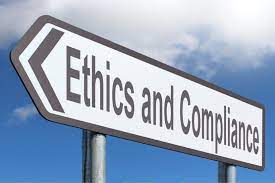Ethics and Compliance not Compliance … Oh, and Ethics

I have a pet peeve in the compliance world. It may be symbolic; it may be petty at the same time; and it may just be a function of my old(er) age. I apologize in advance for this posting, i.e. this rant. Call it my moment on the front lawn yelling at passing cars in the neighborhood. My moment of frustration.
Let’s start with two basic points.
Chief compliance officers are not just CCOs.
Compliance programs are not just compliance programs.
Chief compliance officers are stewards of a company’s culture. CCOs are the point person in facilitating the definition, embedding, promotion, monitoring, intervention and monitoring of a company’s ethical culture!
Assuming the company does not have a separate Chief Ethics Officer, the CCO carries this important responsibility. And rightfully so.
As a result, and to underscore the importance of corporate ethics and culture, the CCO’s proper title is Chief Ethics and Compliance Officer or CECO. Now, I am not one to advocate for corporate complications, but this is important. A CCO’s responsibility for a company’s ethical culture is important and worthy of acknowledgement at every step of the CECO’s activities.

For some reason, many companies do not include Ethics in the title of the CCO but expect the CCO to assume responsibility for a company’s ethical culture. Well, it is high time for companies to confirm this important function with the adjustment of the CCOs title to reflect the priority that the board and senior management place on the company’s ethical culture.
Corporate boards, CEOs and senior executives can no longer avoid the inevitable — if a company’s ethical culture is important, then someone has to be given the responsibility for promoting the company’s ethical culture. Right now, the corporate governance landscape is filled with titles that reflect corporate priorities. Sometimes it is easy to get lost in a morass of corporate ranks and titles. When it comes to a company’s ethical culture, the answer is relatively simple and clear. Either create a separate function responsible for a company’s ethical culture with a leader and staff, or designate the CCO as the Chief Ethics Officer and provide a title worthy of the function — a Chief Ethics and Compliance Officer or CECO.
The same argument supports the renaming of all compliance programs — it is not a compliance and ethics program, or solely a compliance program; instead, the proper phrasing is an “ethics and compliance” program. Ethics comes first and compliance comes second. Ethics is not an afterthought; indeed, ethics is the bedrock or foundational framework from which we build a culture of ethics and compliance.

As I often say (and repeat myself), you can craft effective compliance policies and procedures, but in the absence of a culture of ethics and compliance, those policies and procedures can never accomplish an effective ethics and compliance program. An ethical culture is what defines success — and companies that ignore this basic point are often drowning in a sea of policies and procedures designed to fill in gaps and risks that exist because of the lack of a fundamental culture of ethics and compliance.
I have finished my rant now — it is time for me to walk back to the house, open the screen door, walk back in and stop yelling at the (imaginary?) cars driving by the house. Thank you for listening.















1 Response
[…] Source link […]